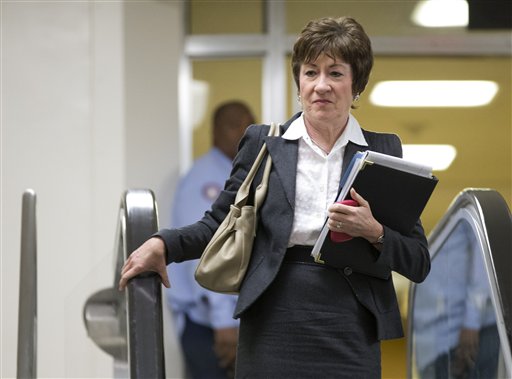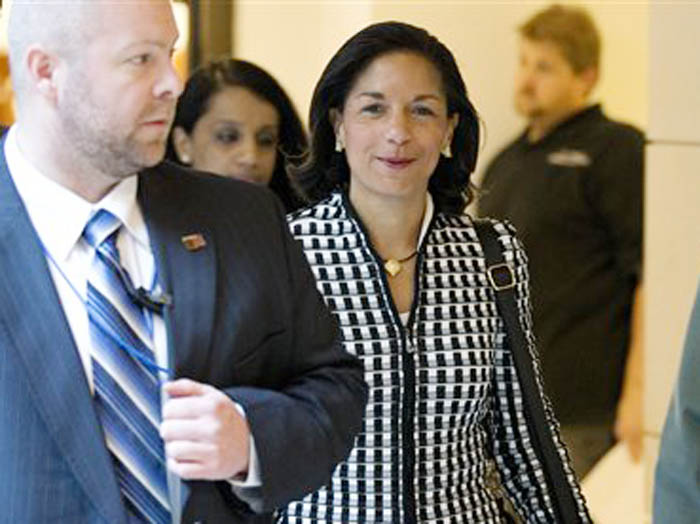WASHINGTON — Maine’s U.S. Sen. Susan Collins said Wednesday that after a one-on-one discussion with United Nations Ambassador Susan Rice, she remains troubled by Rice’s statements about the attack in September on a U.S. facility in Benghazi, Libya.
Collins said she had “many questions that remained unanswered,” despite a meeting with Rice that lasted more than an hour Wednesday morning.
“I continue to be troubled that the U.N. ambassador decided to play what was essentially a political role at the height of a contentious presidential election campaign by agreeing to go on the Sunday (television) shows to present the administration’s position,” Collins told reporters immediately after the meeting.
Rice is under intense scrutiny for making statements in September suggesting that the attack that killed the U.S. ambassador and three other Americans arose from protests that spun out of control rather than a plan by militant groups.
Collins is the latest Republican to criticize Rice over the statements she made five days after the attacks on Sept. 11. But her voice may carry more weight than most, and her criticism of Rice made national news Wednesday. A bank of television cameras and reporters waited for her to emerge from the closed-door meeting with Rice.
Collins is the senior Republican on the Senate Homeland Security and Governmental Affairs Committee. And, as a moderate Republican, she is viewed as a potential key vote if Rice is nominated to succeed Hillary Rodham Clinton as secretary of state.
Collins said it would be “premature” for her to take a position on the nomination that is reportedly being considered by the Obama administration.
But, in another sign of the challenges facing the White House, Collins clearly indicated reservations.
“I will need to have additional information before I could support her nomination,” Collins said. “She has not been (nominated) yet. Our Homeland Security committee investigation (of the attacks in Libya) is ongoing. There are many different players in this and there’s much left to be learned.”
Collins was supportive of Rice, whose mother grew up in Portland, when Rice was nominated in 2008 to be U.N. ambassador.
“I knew her to be an intelligent and talented person,” Collins told CNN Wednesday.
Collins said she still feels that way, but is “concerned that Susan Rice’s credibility may have been damaged.”
On Tuesday, Sens. John McCain of Arizona, Lindsey Graham of South Carolina and Kelly Ayotte of New Hampshire said they emerged from a meeting with Rice with more concerns.
Unlike Collins, the three senators have indicated they might block Rice’s anticipated nomination as secretary of state.
The Obama administration has defended Rice by insisting she was simply using talking points provided by the intelligence community.
The White House and some congressional Democrats have suggested that partisan politics may be behind the attacks on Rice.
White House Press Secretary Jay Carney once again referred Wednesday to an “obsessive focus” on Rice’s statements, which he said are immaterial to the investigation into who carried out the attacks and lessons that can be learned from them.
“As I think the president has said, and I and others have said, it’s a shame to create a sideshow that seems, I think, very clearly to be very political out of something that really has no bearing on what happened in Benghazi,” Carney said at a press briefing, according to a transcript.
The president, meanwhile, praised Rice’s service at the United Nations and led a round of applause for her during a Cabinet meeting that she attended.
“Susan Rice is extraordinary,” Obama said, according to the transcript. “I couldn’t be prouder of the job that she’s done” as the U.N. ambassador.
As the top Republican on the Homeland Security committee, Collins could have considerable influence as the panel investigates the events surrounding the Benghazi attacks.
Collins and committee Chairman Joseph Lieberman, I-Conn., have pledged to conduct a fair, bipartisan investigation. But the largely Republican criticism of Rice and the Democratic response underscore the potential for further political tension over Benghazi.
In another possible signal to the administration concerning Rice, Collins said she believes that the other rumored top contender for secretary of state — Democratic Sen. John Kerry of Massachusetts — would be an “excellent appointment” and would face a much easier approval process in the Senate.
Collins said she asked Rice why she did not mention in media interviews the fact that some on-the-ground sources in Libya believed the attack was planned by terrorist groups.
“I don’t understand why she did not at least qualify her response,” Collins said.
Collins also appeared to broaden her queries beyond Benghazi by linking the violence — and Rice — to terrorist attacks on U.S. embassies in Africa in 1998.
Rice was assistant secretary for African affairs in the State Department at the time of those bombings, which killed 12 Americans and wounded thousands of local residents.
As in Benghazi, the U.S. ambassador requested additional security but was turned down by the State Department. Collins said Rice told her she was not directly involved in that decision, but the senator appeared to press the connection.
“Surely, given her position as assistant secretary of African affairs, she had to be aware of the general threat assessments and of the ambassador’s repeated requests for more security,” Collins said.
In a statement released after Tuesday’s meetings with senators, Rice acknowledged that her statements after the Benghazi attack were wrong but said the situation was still developing at the time.
“The talking points provided by the intelligence community, and the initial assessment upon which they were based, were incorrect in a key respect: There was no protest or demonstration in Benghazi,” Rice said.
“While we certainly wish that we had had perfect information just days after the terrorist attack, as is often the case, the intelligence assessment has evolved,” she said.
Washington Bureau Chief Kevin Miller can be contacted at 317-6256 or at:
kmiller@mainetoday.com
Send questions/comments to the editors.





Comments are no longer available on this story